Park Warden Service Alumni Society
Oral History Project Phase 14
Phone Interview with Jo Williams
Date/time: June 2024
Interviewed by Monique Hunkeler
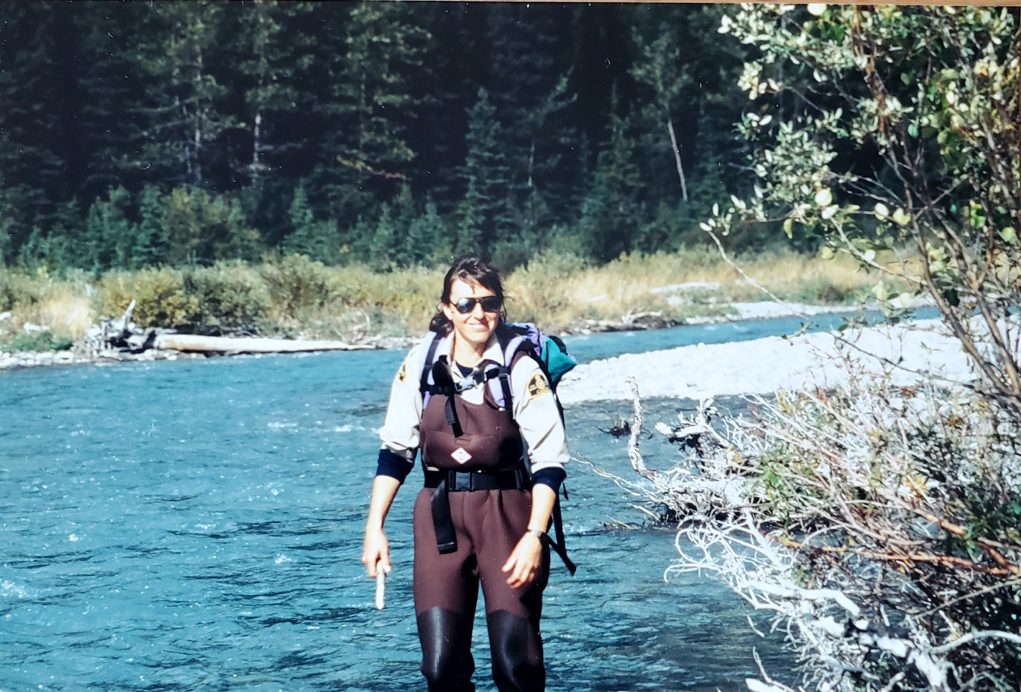
Clearwater River work with Charlie Pacas
MH: Where and what year were you born?
JW: I was born in 1959 in Kitchener, Ontario.
MH: Where did you grow up and finish school?
JW: I grew up in small towns, rural areas in Southern Ontario, New Hamburg. My high school was Waterloo/Oxford, I finished in grade 13 and started Environmental Studies. I never finished that program. I did the one year and then moved out to British Columbia. And probably a lot of people will note that I was under a previous name for part of my service under Cairns. I had married at that time and moved west.
MH: Did you attend a post-secondary school/institution?
JW: I did a few different things and then finished off a Bachelor of Science and Environmental Studies. It was a new program at the University of Lethbridge, an individual multidisciplinary major. It was a self-tailored program and I wanted it to be based a lot around Parks and park management. My specific program became so popular that many others wanted to do it and it eventually evolved into a full-on Environmental Studies Program which then evolved into tying into the Lethbridge College programs.
MH: How did you become involved with the Warden Service?
JW: When living in Invermere, I got a job with visitor services working in Kootenay National Park and I was exposed to the warden service there at the time. It was intriguing to me and I just got crazy on parks and the whole concept of preservation. I had already started on that line of thought in high school. Some of my first jobs were working in the remote campgrounds like McLeod Meadows and Marble Canyon. I was working a lot directly with wardens like Pete Enderwick and John Taylor, Byron Irons, Brian Sheehan, Hans Fuhrer. I also took some pretty cool assignments through Visitor Services thanks to Cal Bjorgan, which landed me working a few seasons in the old Warden Office sitting in the cliffs above the hot springs. We had so much fun in there. We would just laugh and laugh. I got some really great exposure and opportunities there, running projects, a stint on the trail crew with some characters like Cecil Cooper and Art Galbraith, again with so many laughs. I developed the first quota and reservation system for the backcountry in the Mountain Parks in Kootenay because the Rockwall Trail was getting plugged up and so overrun with use at the time. It was the heyday of backpacking in the late 70s. The guys supported me later when I moved into Provincial Parks. I saw that as being a great stepping stone. I got hired by Alberta Provincial Parks, Kananaskis Country, Elbow District. I got lots of exposure to public safety, campground enforcement, hunting and fishing enforcement, searches, patrolling the off-highway vehicle zone on quad, trike, motorbike and snowmobile. We dealt with everything the City of Calgary could throw our way being a nearby busy recreation area. I learned campground management skills and verbal judo from the best in the Elbow where long time rangers there were top notch at dealing with the worst of the worst in the campgrounds near the city. I was also lucky enough to get to know and work with Lloyd Gallagher many times.
MH: Which national park did you start working in? 0458
JW: As a Warden it would have been Yoho National Park and then onto Waterton National Park and then to Banff National Park, and then back to Kootenay National Park when I was pregnant.
MH: What made you want to join the Warden Service?
JW: I believed in the whole preservation and protection, and also the enjoyment for visitors. Seeing all the things that those guys were involved, and it was so multi-faceted, and it was pretty exciting job, even way back then.
MH: What different parks did you work in? How do they compare? Do you have a favourite?
JW: They were all so different. Yoho had that element of a through- highway that was really challenging at times, the accident, weather and traffic. I want to say Waterton is still my favorite not just because of the landscape, but that little community there, especially off season, was your family and some of those people are still like family. There was so much wildlife and a unique vegetation as well as lots going on, but you were kind of on your own down there. There were the Banff people in the center of action, but we just did our thing down there in Waterton. That little townsite would get super busy and would have cougars, aggressive deer and bears running around. Not so much law enforcement but antler poaching was big.
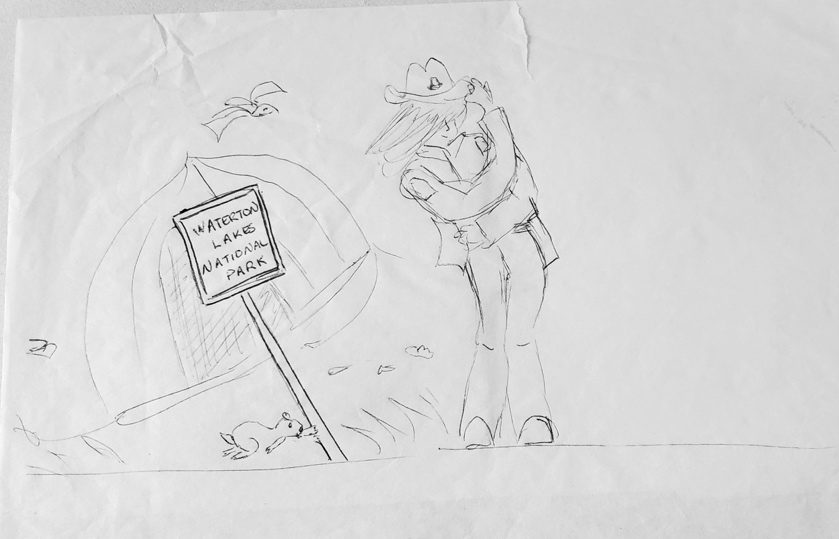
Waterton Lakes National Park wind comic
MH: What were your main duties/responsibilities over the years?
JW: I would say I did a lot of duty warden stuff. I took assignments at times here and there, but a lot of my time was operational, like front country highways, campgrounds, townsites, that first response stuff. That’s what made it really super interesting. Every day brought something different especially in Banff, there was just something going on there all the time. Always something different and you just were responding constantly. Over the years I did different resource projects, like lake and river sampling, fishery stuff, culvert restoration. I loved the human wildlife conflict stuff especially the last number of years I worked for Hal Morrison in the Lake Louise Yoho Kootenay (LLYK) field unit where I was largely able to manage the Kootenay program myself. I worked with Glen Peers lots in Banff before that.
MH: What did you like the best about being a Warden?
JW: We always had a lot of freedom, whether that was good or bad, right or wrong, you could plan your own day often and patrol where you wanted or walk where you wanted. What I did learn is when you are out there, you find stuff. If you sit in the office you don’t even know what’s happening. So there often was no rigid agenda and I loved going around talking with the visitors. That was what I liked the best about it.
MH: What did you like the least?
JW: I’m going to say a lot of that highway exposure. Those years in Yoho National Park on the Trans-Canada highway were ugly at times, not just the accidents with MVAs involving people, but lots of wildlife mortalities. I remember, the first week I worked there, I thought, “oh, boy, all I’m doing is picking up dead things”. It was discouraging. It was kind of the same in Kootenay National Park before they had some of the mitigations, it was like a race way through there. People coming from Calgary every weekend to the Columbia Valley and you get off that highway just about shaking some days going home, feeling like you needed a drink. I can’t count the number of moose, elk and deer I moved in that park and also a few grizzlies. Sometimes we were loading up a carcass while the wolves paced in the background. With the invention of the Lake Louise, Yoho and Kootenay Field Unit, there was even more white-knuckle driving. There were days where I was working on aquatic project switch and Shelly Humphries and I’d get up early and leave Radium, drive the hour and a half to Lake Louise; hike 5 kilometers into Hidden Lake, maybe carrying a big load of fishing and sampling gear running into grizzly bears, do our field work and then hike out and drive the one and a half hours of highways back home. By then the highway would be busy, and it was stressful at times for sure on that highway. You were driving a marked vehicle and observing incessant highway infractions like dangerous passes and excessive speeds but we couldn’t deal with all of that.
In Yoho, I think all of us had the ambulance certification so we did drive ambulance sometimes and Graham Pole spent years in Yoho as our solid ambulance attendant. He was such an asset to have, always there and always available. Yeah, there was some crazy times on the highways and we used to write tickets on the highways too and I think now oh my gosh, you never knew what or who you were going to encounter.
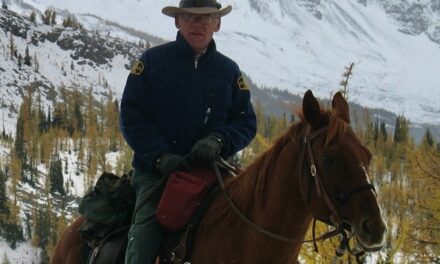
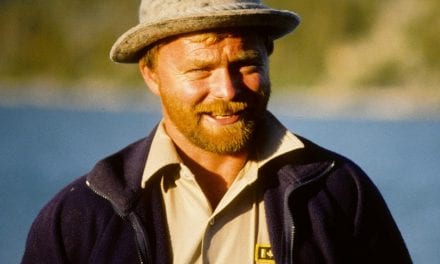
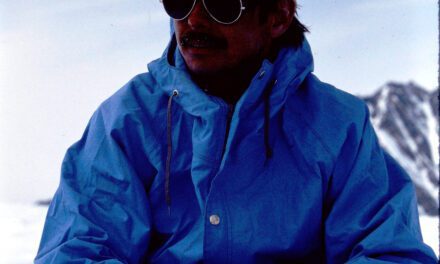
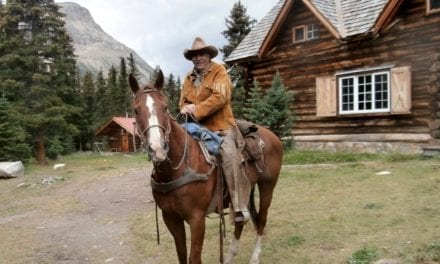
What an excellent interview.
Jo had an exciting and fascinating career!
Always with a sunny and positive attitude.